If you visit any pool supply store in St. George, you will notice that the options for pool chemicals are nearly endless. This article is designed to show you the chemicals used at Splash Doctor, a professional pool service company in Southern Utah, and why we think some are not as worthwhile. At Splash Doctor, we normally use chlorine, muriatic acid, cyanuric acid(chlorine stabilizer), salt, calcium hardener, calcium softener(PH Balancer), PH riser(soda ash), alkalinity increaser(sodium bicarbonate), and shock to name a few. We will go over each of these in detail below as well as provide links for where to buy and what concentrations we recommend.
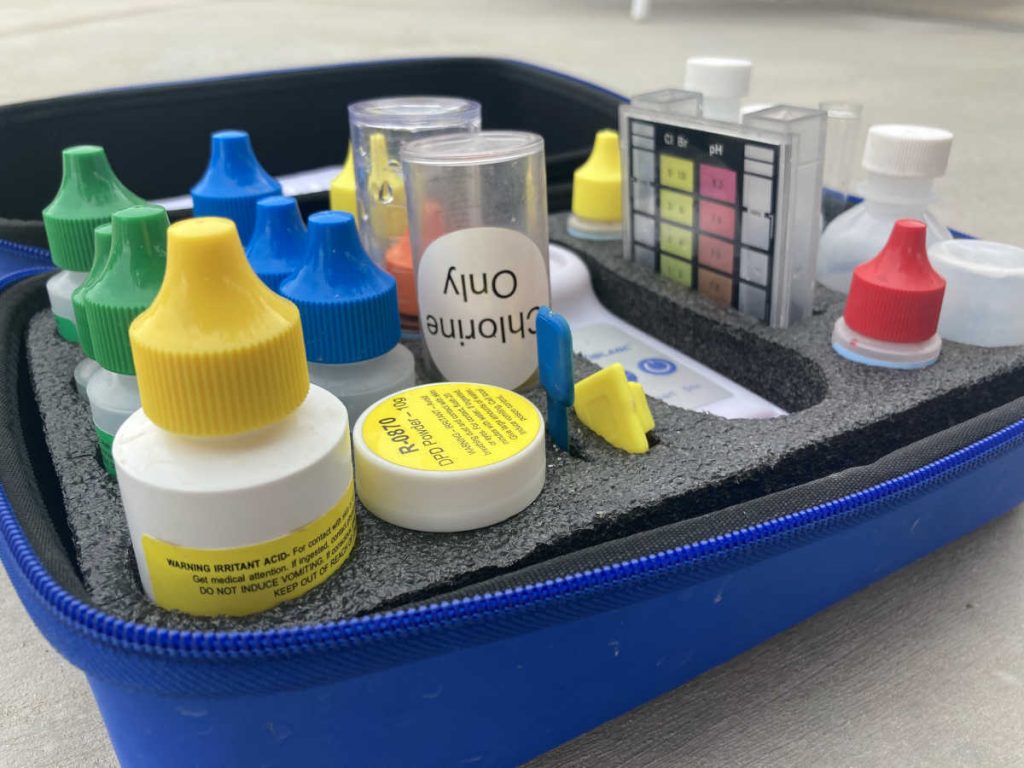
Swimming Pool Chemicals-Chlorine
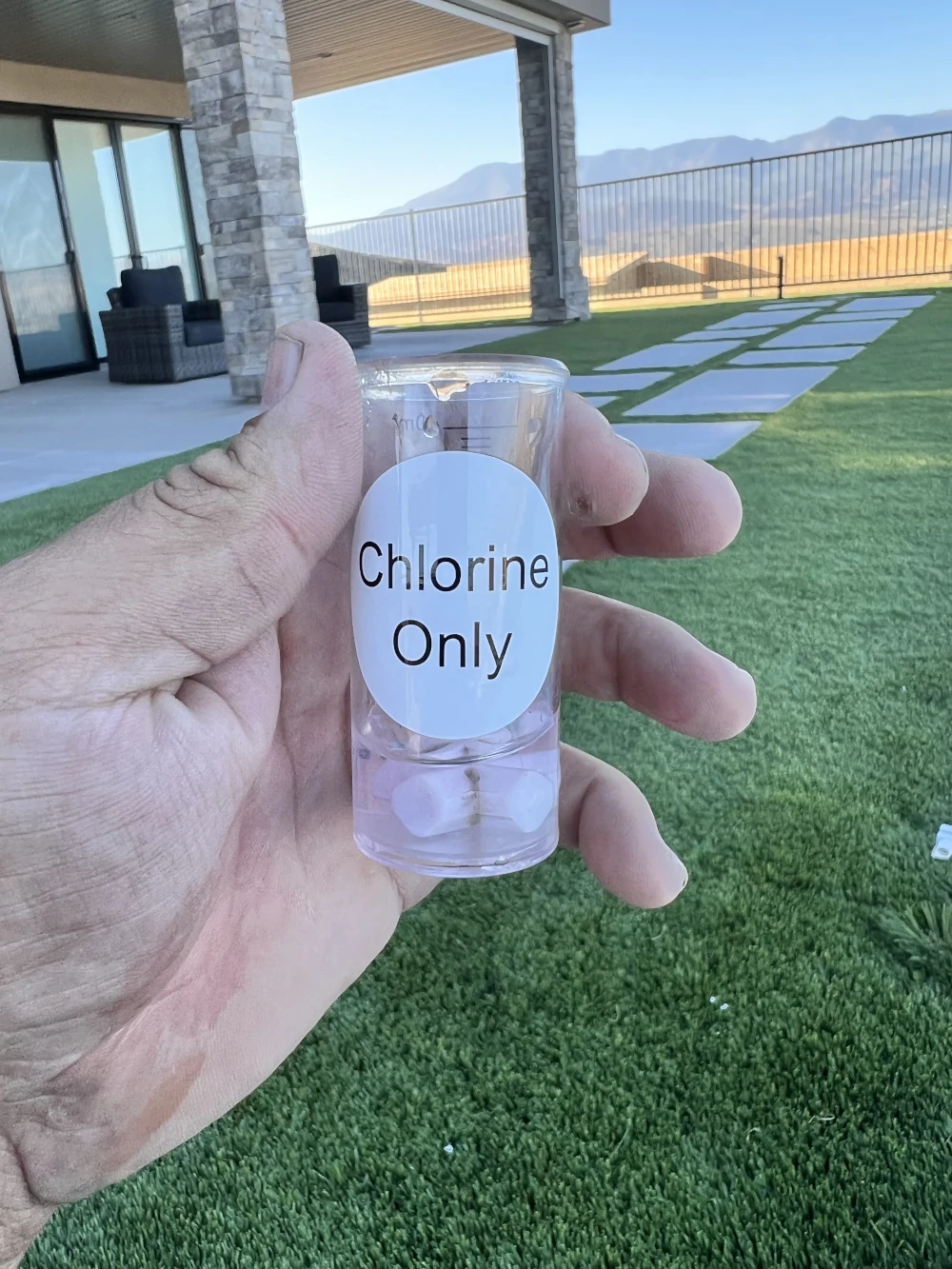
Chlorine-chlorine is created using a salt water generator or added to the pool in solid, powder, or liquid form. Chlorine tablets can be added to a chlorine floater or a chlorine tower. Liquid chlorine is added slowly throughout the pool manually or through a sense and dispense system like the Pentair Intellichem.
If using a salt water generator, the salt in the water(sodium chloride) is run through an electrolyzed metal plate. This electrically charges the salt water and splits the salt molecules. Salt consists of two types of molecules, sodium, and chloride. When this electrolysis splits the molecules, chloride or chlorine is generated. The amount of chlorine generated is controlled by how long the salt cell is energized.
Your pool’s chlorine level will be expressed in terms of parts per million or ppm. The amount of chlorine your pool will require will be based on the time of year, temperature, cyanuric acid level, and bather load. Cyanuric Acid(CYA) is a chlorine stabilizer. The higher your level of CYA, the higher your required chlorine concentration. You can use the calculator below to calculate your basic chlorine requirement.
Testing Chlorine Level in Your Swimming Pool
There are quite a few ways to test the level of chlorine in your swimming pool. We will show you a few of the common methods and why we prefer the FAS (Ferrous aluminum sulfate) DPD (diethyl phenylenediamine) type tests at Splash Doctor.
The first option to test your chlorine would be to use chlorine test strips. The test strip is one of the simplest methods but is highly inaccurate. Take a test strip and dip it into the pool or spa water at a minimum of elbow deep. Shake off the excess water on the strip. Hold the strip level with the color chart and compare. To achieve the most accurate results with this test, compare within 15 seconds of wetting the strip. While this option is great for determining whether or not chlorine is present, getting precise results is less likely.
The second option is to use reagents and color match. R-0600 is the reagent used in this test. First, take your comparator test tube and fill to the line. Add 5 drops of R-0600 and put the lid back on. Shake to mix and hold up to a white paper to compare the results in your test tube with the color comparator. The color that most closely resembles the color in the test tube is your free chlorine level.
The third and most accurate test is the FAS DPD, or ferrous aluminum sulfate, diethyl phenylenediamine test. To perform this test you can choose to either use 10 ml or 25 ml of water depending on how accurate you need it to be.
At Splash Doctor, we use the 10 ml test. First, fill your test tube to 10 ml and add one heaping scoop of DPD powder which is reagent R-0870. This should turn your water pink. If the water stays clear you have 0 chlorine. At Splash Doctor we use a speed stir to mix to make it quicker and easier. Next, add FAS which is R-0871, drop by drop, and count the total drops it takes to make the pink water clear. Take the total drops added and multiply it by .5. This gives you your free chlorine level.
If you need more accuracy, use the 25 ml level in your test tube and perform the same test. To find the chlorine level take the total drops and multiply by .2. This is the most accurate test for chlorine.
Acid levels need to remain balanced in swimming pools and spas
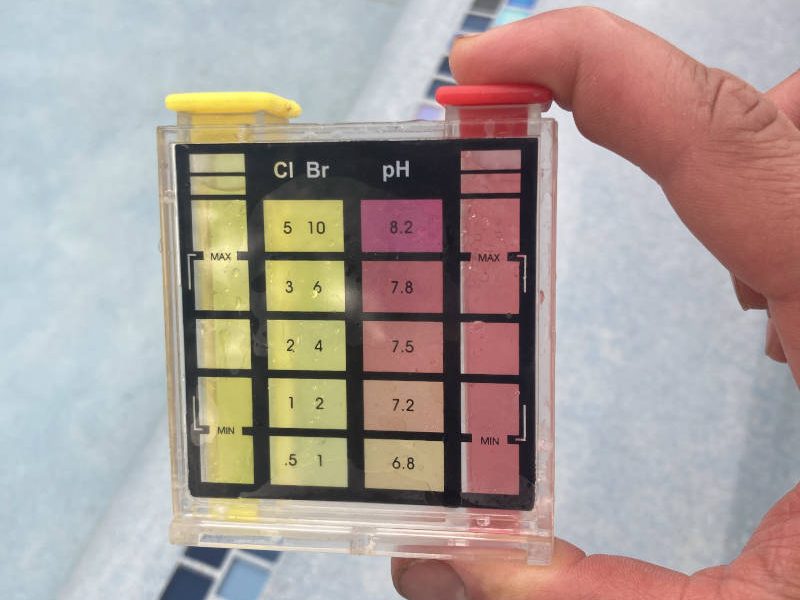
Pool Chemicals-Muriatic Acid
Muriatic acid is used to help the pH level in a stabilized swimming pool to regulate. Normally pH will increase over time. Muriatic acid helps combat this. The pH level can increase more rapidly with quick increases in temperature, aeration, and an increase in chlorine. We keep the pH at a proper level by adding muriatic acid. We typically try to keep your swimming pool between 7.2-7.8 with 7.5 being ideal.
If for some reason your swimming pool has an extremely low pH we can add soda ash(pH riser) to increase it back up to reasonable levels. The threat to your swimming pool with extremely low pH levels is increased plaster wear and shorter plaster life. The threat to a pH that is too high is scaling and build-up.
Pool Chemicals-Cyanuric Acid
Cyanuric acid is different than muriatic acid. In order to most efficiently use chlorine in a swimming pool, our swimming pool service technician will add cyanuric acid or CYA which is sometimes called a stabilizer. This chemical helps to prevent the sun from being able to burn through your free chlorine levels at too rapid a rate.
Excessively high CYA levels, however, can cause a higher demand for chlorine, for the same given result, as would be required at lower CYA levels. Salt water pools also have different requirements for CYA/chlorine relationships as simply chlorine swimming pools without salt water generators. Our technicians understand these relationships and will maintain your pool at a proper cya and chlorine level To keep your water clear.
Salt in your swimming pool
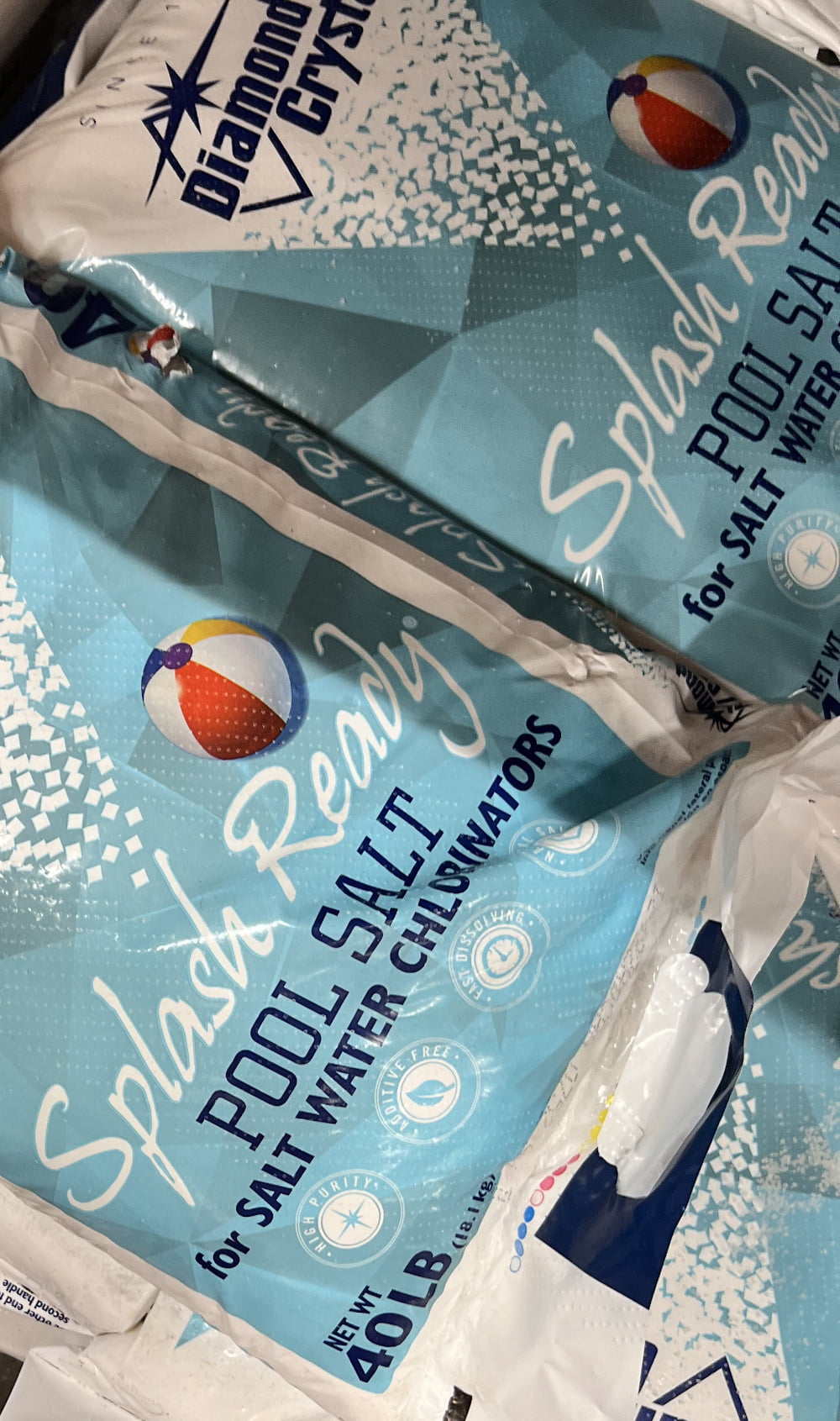
Salt is found in almost all culinary water to one degree or another. In a swimming pool that utilizes a salt water generator, you will require an increased salt concentration. Typically salt levels in salt water swimming pools will be from 2800 parts per million to 3200 parts per million. This can vary by salt water generator type and manufacturer’s recommendations for your particular generator might be different.
Splash Dr. will ensure your salt levels are at the proper ppm for your particular salt water generator. This ensures your generator creates the most possible chlorine for the run time that it can. If your swimming pool salt level is low, one of our swimming pool service technicians will add enough to bring it back to the proper levels.
By keeping your pool chemicals in check, you will be able to keep your swimming pool and spa plaster beautiful for life
Calcium hardener can be used in the rare event you have low levels of calcium in your swimming pool. Concrete gunite or shotcrete swimming pools with a plaster finish typically will slowly increase the calcium hardness level over time. If you have ever seen hard water, which in Southern Utah is everywhere, this causes all kinds of issues for your swimming pool.
Occasionally we need to adjust this level up or down to ensure the proper level is reached. To increase your Calcium level we add a calcium hardness increaser. To decrease the level we either remove some water and replace it, add muriatic acid, or we can reduce it by adding a sequestering agent. The best solution for high calcium levels is to not let them get there in the first place! Every time you shock your pool with Cal-Hypo or something similar you add calcium. We know water is hard in Southern Utah, which is why we shock all our pools with liquid chlorine. This does not add any calcium and keeps your water clean and sanitized much more efficiently.
By maintaining a proper PH your calcium hardness level will be more stable and you prevent excessive calcium deposits on tile and finish work and keep calcium levels in the plaster optimum. This in turn will extend the life of both your plaster as well as your tile and grout. Your plumbing and equipment will also be helped.
When Should I Shock My Swimming Pool In St. George Utah
We find the need to shock/slam a swimming pool when a pool has been neglected or just isn’t maintaining stabilized levels for a client. Usually, there is either algae or bacteria growing. Our pool technician can run an overnight free chlorine test and determine pretty quickly if your swimming pool has algae living in it. If this is the case, the level of your chlorine will need to be increased to what we call the slam/shock level. This level is based on your CYA and type of pool.
We will keep your swimming pool at the slam/shock level for as long as it takes until your overnight chlorine test passes. At that point, we will let the sun do its work and bring your chlorine level back down to swimmable levels. Our swimming pool weekly service will maintain your chlorine and cya levels appropriately so hopefully you never have to shock/slam your pool after the initial correction however sometimes algae can still form. By weekly testing, we ensure your pool stays at the optimal level of chlorine to prevent this from happening.
If you would like a free water test and consultation for your swimming pool schedule it today! If you would like to maintain your swimming pool on your own, Splash Dr. provides chemicals as well.
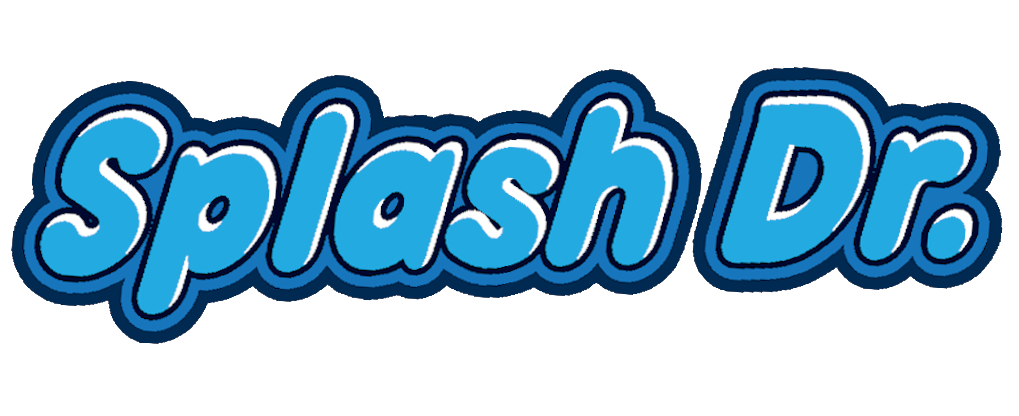
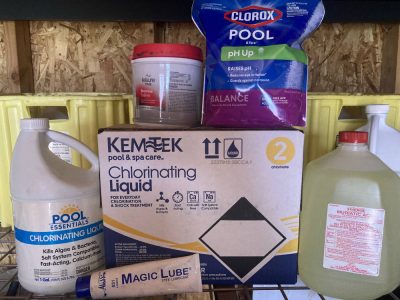
 Pool Service of the Week in Saint George Utah
Pool Service of the Week in Saint George Utah